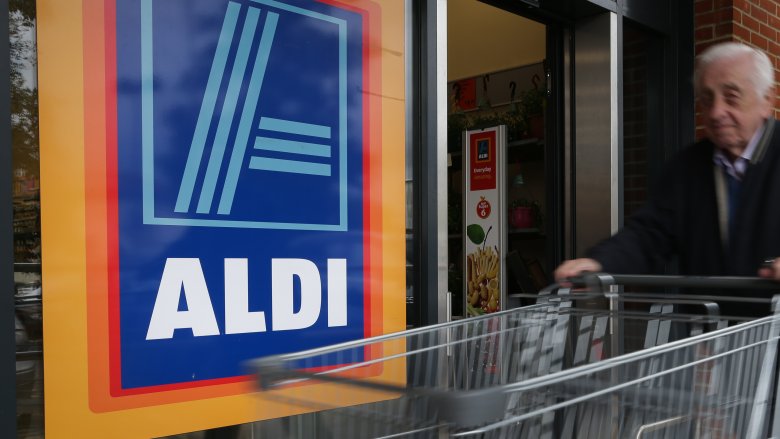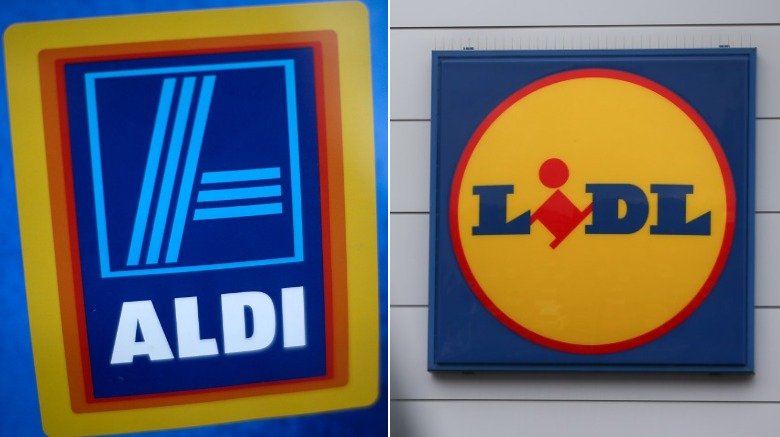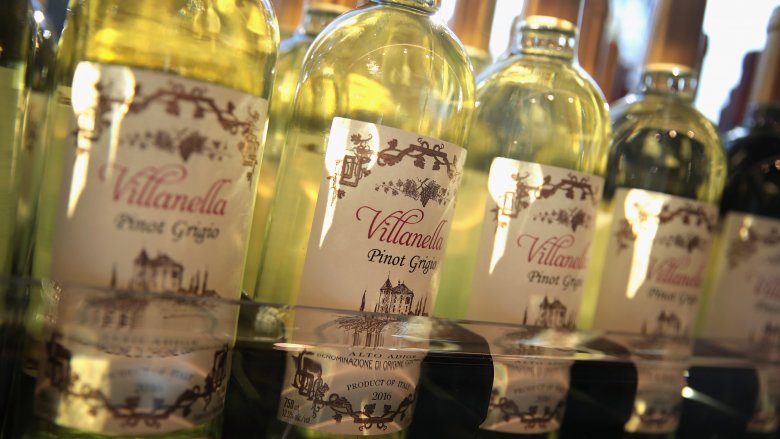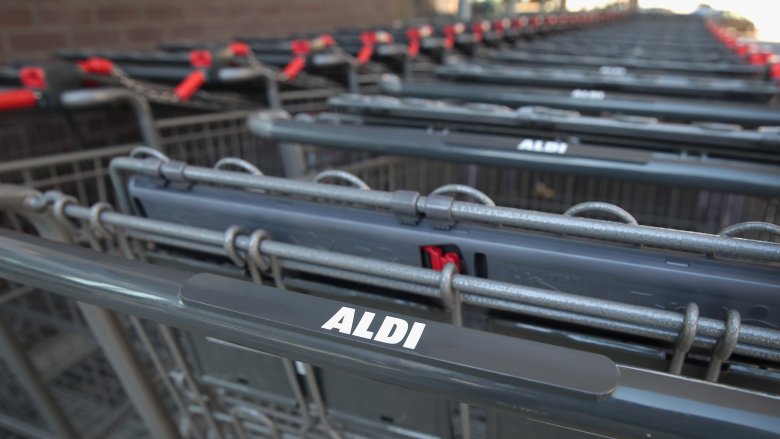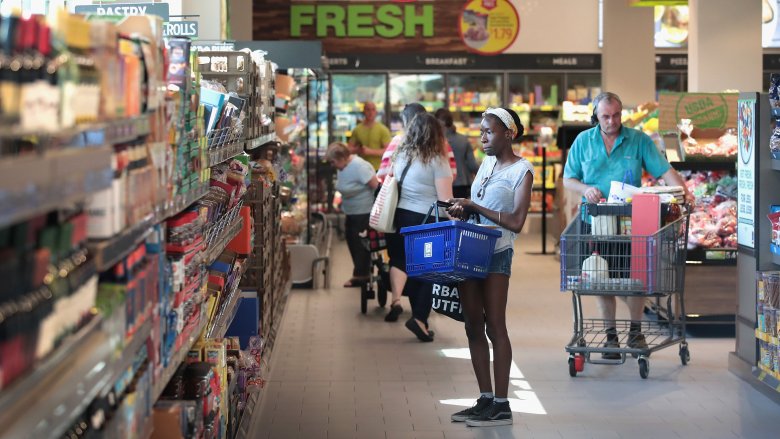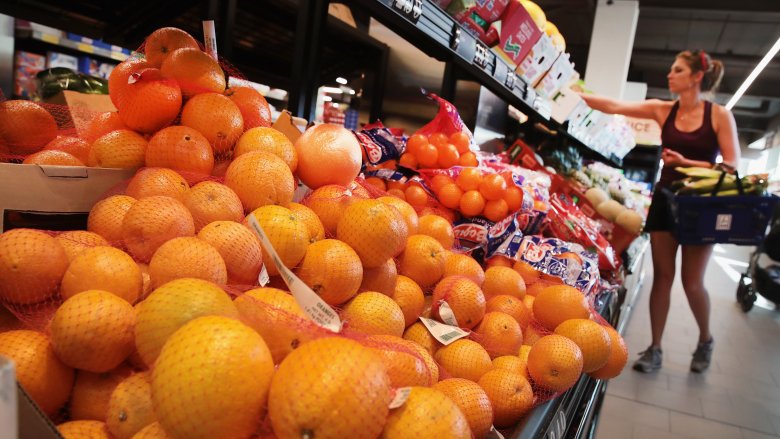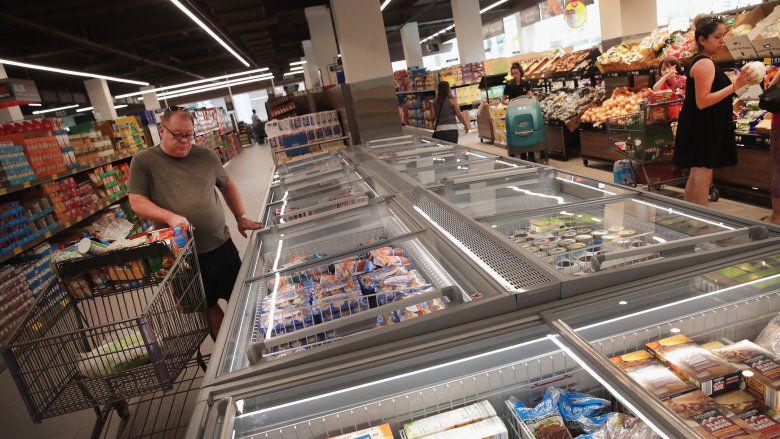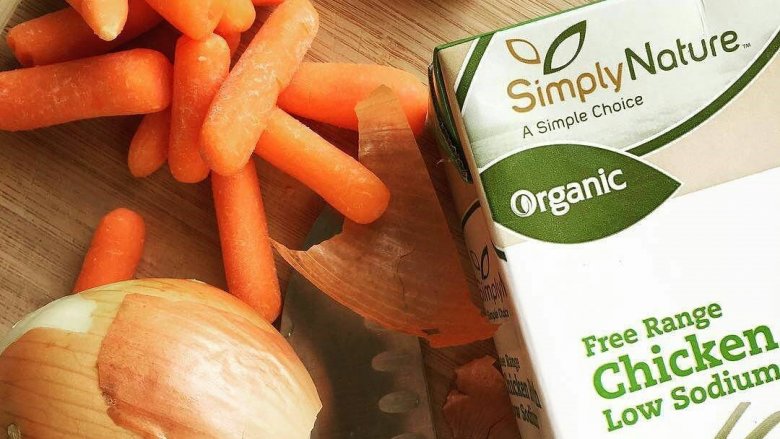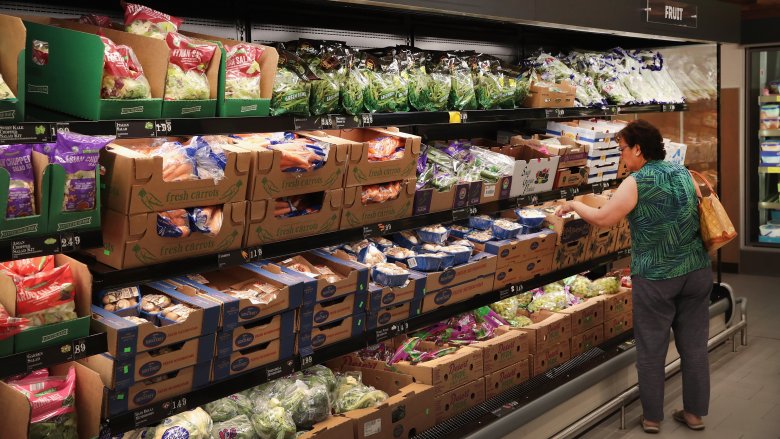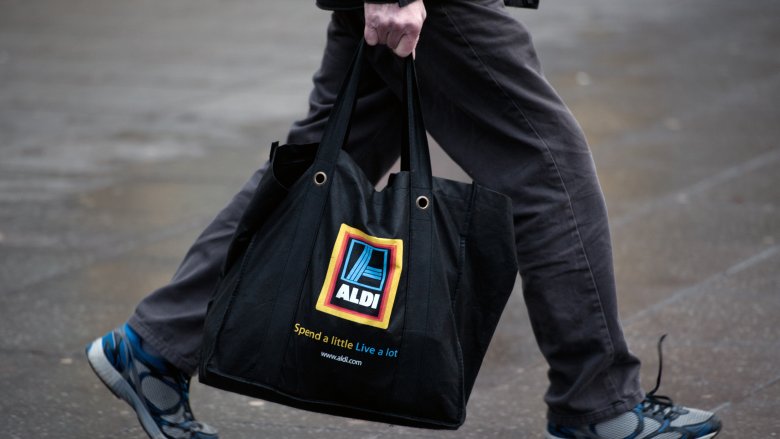What Everyone Gets Wrong About Aldi
There are a ton of people who swear by Aldi. They might not have everything you're ever going to need — they only carry a fraction of the amount of products traditional grocery stores do, but that's part of what allows them to keep their prices so low. But they still have all the necessities you'll really need to put together three square meals a day for everyone in your family.
That said, there are still a ton of people who haven't tried Aldi at all, and part of the reason people might shy away is that there's a ton of misinformation and rumors floating around out there. Aldi was slow to push into the US, and the idea of a discount grocer sounds, well, like not a great thing. You're going to be putting this food on your family's plates, after all.
But, look at it this way. The words "discount" and "affordable" don't necessarily mean poor quality, and in Aldi's case, they definitely don't. So, let's clear up some major misconceptions that might be keeping Americans from heading out to this German giant. Here's what everyone gets wrong about Aldi.
Aldi and Lidl are not the same
This one pops up a lot on social media, and it's the belief that Germany's two discount grocery stores — Aldi and Lidl — are owned by the same company. They're not, but it's more complicated than that.
The first Lidl stores were opened in 1973 by Dieter Schwarz, who built his grocery store empire on the shoulders of a warehousing company his father founded.
Aldi goes back farther, founded in 1961 by the Albrecht family. Since then, Aldi has been through some major changes. Not long after opening, brothers Theo and Karl came across an issue they couldn't agree on: whether or not they should sell cigarettes. Instead of compromising, they split the company in half. Theo took Aldi North (which spread to countries like France and Poland), while Karl took Aldi South (which you can find in the UK and Ireland).
There's only one Aldi branch per country, except for Germany and the US. There's an "Aldi equator" that separates them in Germany, but in the US, Aldi South does business as Aldi, while Aldi North does business as Trader Joe's.
There you have it — Aldi does have links to Trader Joe's... but they're no relation to Lidl.
You can't use coupons
Aldi's prices are low already, but when you grew up clipping coupons it's a tough habit to break. They're pretty awesome and let you save more, and every so often you'll see something popping up on Facebook talking about Aldi coupons. Unfortunately for coupon cutters, it's just not true. Not any of it, says the Tampa Bay Times.
Aldi won't honor your manufacturer's coupons, and according to the Dayton Daily News, there have been a number of scams that show up on social media and try to tempt you with promises of Aldi coupons. They usually ask you to complete some sort of survey, and Aldi has warned customers for a long time that any coupon deals they might see online are fake. That includes insane offers like coupons that say they'll give you $75 off any purchase of $80 or more, a scam that circulated in 2017. If you've ever wondered if you should print it out just in case, don't bother.
On very rare occasions, Aldi may release coupons to be used in-store for a special promotion, but according to their website, those will either come straight to your mailbox (via snail-mail), or be available in-store.
Their wines are definitely not lacking
Be honest. You're going out to dinner at a colleague's house, and you want to bring a nice bottle of wine. You probably wouldn't think of going to Aldi for a bottle or two, because that's cheap wine, right? Wrong... sort of. It's affordable, and award-winning.
Aldi US has a whole slew of awards, with almost every one of the wines on their shelves either getting an award of some sort or a high score from wine reviewers. Don't believe them? You should!
USA Wine Ratings has some glowing praise for their wines, using phrases like "surprisingly sophisticated," "so smooth... you could easily enjoy it all by itself," and "a refreshing, crisp finish" to describe various wines, while Colangelo & Partners certified sommelier Lydia Richards highly recommended (via SELF) a number of bottles that came in under the $10 price point. She says there are plenty of options that are perfectly respectable wines, and they have such a wide range it's a guarantee you can find one for every meal and every palate. Don't fear the Aldi wine!
Aldi's store brand products are not low-quality
Sure, Aldi does a lot of things to make sure they can keep their prices so low, but compromising on quality isn't one of them.
Taste of Home took a look at Aldi's product line, and Aldi spokesperson Kate Kirkpatrick put it like this: "We test our products to meet or beat the national brands' quality." And it makes sense — a poor or bad-tasting product isn't going to keep customers coming back, no matter how cheap it is.
Aldi tests each and every one of their products multiple times before it makes it onto the shelves, and once they're there, they're still getting and assessing feedback. They have a test kitchen in Illinois, and every so often they invite food bloggers to go behind the scenes. Joyful Healthy Eats was one of those bloggers, and she was shocked when they were treated to a side-by-side taste test where Aldi put their products up against national brands. More often than not, Aldi won hands down. Maybe it's because they have more to prove, but they're known for going the extra mile when it comes to taste, quality, and ingredients.
You don't have to pay to use shopping carts
America and Europe have very, very different ideas about shopping carts (or rather, trolleys) and remember — Aldi is German. In Europe, it's standard practice to have coin-operated locks on shopping carts to encourage people to be good citizens and return the carts. Aldi and Lidl both do it in Europe, and bigger, more expensive chains like Tesco do it, too. It looks strange to Americans who are used to just dumping their carts in parking lots and having someone collect them, and it's given rise to a rumor you have to pay to use the carts.
You don't — you get the money back, as long as you return it when you're done shopping. The benefits are twofold: not only do they not have to employ people to collect carts constantly, but those dents in your car door that happen from people's abandoned carts? That doesn't happen at Aldi. It's a win-win, and don't worry — remembering your coin becomes second nature after a while.
There are some name brands
Those private label brands help keep Aldi's prices low, and they also give them pretty complete control over everything that goes on their shelves. But when Aldi expanded into America, they found that what Americans really wanted were their name-brand favorites. So, Aldi US is just a little different than Aldi in Europe. How much different? About 10 percent.
Name brands are a relatively recent addition to Aldi US, and they say it was done because a huge percentage of their customers had asked for them. They wanted to be more of a one-stop shopping experience for people, and they added that name brands might also show up if they couldn't produce a product that was equal to or better than the name brand competition. For now, private label brands make up about 90 percent of what's on shelves.
That said, they'd also like you to look at it this way when it comes to their private label stock: "...people would not keep coming back and we wouldn't be growing the way we are if we didn't have exceptional, premium products." Point taken!
Their produce is actually pretty impressive
What do you picture when you think of Aldi's fruit and vegetable selection? Rumor on social media has it that you're in for sifting through piles to find the least-bruised options, but that's not the case at all.
In August 2018, Aldi was a year into their $5.3 billion US expansion, and CNBC says a huge part of that is expanding their produce selection. They say the chain's organic produce sales increased by about 200 percent in the previous three years, and according to Aldi US CEO Jason Hart (via Fortune), produce is a huge part of their push into the US. They're not only building new stores, but they're remodeling old ones, and all stores are getting an overhaul to things like organic produce, ready-to-eat sliced fruits, single-serve veggie and fruit packs, and salad bowls. Hart says they've now got the experience to "carefully select and introduce new products that satisfy our customers' increasing preferences for fresh items." So there you have it, right from the source.
Those Special Buys aren't all that random
Aldi naysayers often spout off on how they'll sell anything if they can get it super-cheap, and that's probably a misconception that comes from their Special Buys. Needless to say, this one isn't true, either, so let's take just a few examples.
Those Special Buys are anything from potting soil and flowers to hot tubs and unicycles, and it can seem very, very random. But the Star Tribune says it's based on principles of "opportunistic buying", and there are a few things at work here. Aldi buyers are approached by companies looking to offload surplus merchandise at low prices, and Aldi buys what they know sells. They know it sells because they stock thousands of oddball items a year, and they have the sales history of a lot of years behind them. The element of surprise also keeps customers coming back, so there's another bonus.
They're great for anyone with special dietary needs
Since Aldi carries a relatively small number of items — around 1,400 core items compared to 30,000 to 40,000 at Kroger or Wegmans — it might seem like they're not going to have what you need for that family member who's on a restricted diet.
Not so fast.
Aldi US's Simply Nature line consists of around 200 products that are USDA Certified Organic or are verified by the Non-GMO Project. Then, there's the liveGfree line, that meets the gluten-free certifications of organizations like the Celiac Sprue Association and includes things like pasta, bread, cookies, and granola. The Never Any! line is a line of meat products certified free of hormones, animal by-products, and antibiotics, while the Earth Grown line is certified vegan and vegetarian. How's that for special dietary needs?
Take a look at Aldi's offerings in Europe, and there's a good chance these lines will expand. Aldi UK has a series of products that are dairy- and lactose-free, and Aldi Ireland even offers Halal meats.
They're not just for lower-income families
There's a rumor that Aldi only caters to lower-income families, but that's absolutely not true.
Business Insider did a massive profile on shoppers of all income brackets from Walmart, Kmart, Target, Aldi, and Kohl's. The largest portion of their shoppers — about 29 percent — were from the income bracket that earned between $25,000 and $49,900 a year. That's only part of the story, though. Shoppers earning more than $100,000 a year made up about 16 percent of Aldi shoppers, and that's telling.
It's a trend that follows Aldi everywhere. In 2015, The Telegraph reported that one in every three shoppers who frequented Aldi and Lidl fell into the income brackets considered to be "upper middle class" or "middle class" and to clarify, This is Money says UK's middle class is defined as on par with a family of four who has a disposable, yearly income of between $29,000 and $87,000. Analysts in the UK chalk that up to Aldi's addition of things like premium wines and fresh foods, and considering they also offer some of those same everyday luxuries to American customers, there's nothing to suggest anyone of any income bracket should be avoiding Aldi.
Those reusable shopping bags are not a rip-off
This is another one of those things Aldi brought across the pond with them, and it's not entirely surprising people complain — a lot — about buying shopping bags when they head to Aldi. But look at it this way: they're reusable, and they don't even cost that much.
The Aldi Nerd says while it'll cost you around a dime for a thin, flimsy shopping bag, you can pick up some heavy-duty shopping bags and even some thermal, insulated bags for an affordable price. Isn't a bag that's going to keep your cold things cold worth the price anyway?
Not handing out a ton of free bags is another way Aldi keeps their prices low, and by going this way you're doing the environment a massive favor. According to Australia's Northern Territory Environment Protection Authority, plastic bags often find their way into the oceans where they're mistaken for food and can slowly kill the animals that ingest them. That's not a problem with a reusable green bag, and while you need to reuse your bag more than 100 times to make it fully sustainable and negate the emissions cost of producing it, well, you were going to do that anyway, right?
And if you're still not sold on buying one of their bags... just bring your own from home.
